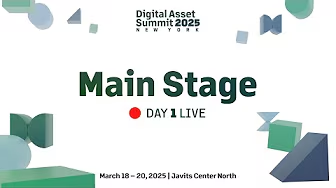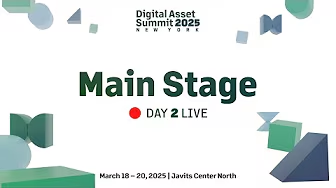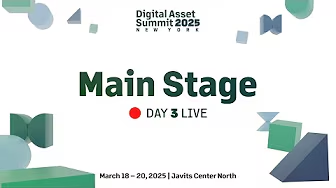Watch the Digital Asset Summit 2025 NYC's Recap Talk.
LedgerNotes is your shortcut to the sharpest insights from top crypto events. Think of it like Cliff notes, but for conferences — built for those who need the signal without the noise.
Digital Asset Summit 2025 NY brought together the sharpest minds in institutional asset management, policy, and crypto infrastructure to chart the next chapter of onchain finance.
If you missed it, we’ve got your back — these are the takeaways that actually matter.
Day 1 - Big Takeaways
What Financial Controllers Should Actually Pay Attention ToFrom shifting institutional inflows to new reporting challenges in staking and stablecoin income, here are the sessions that matter most — decoded for Web3 finance teams.
MICHAEL IPPOLITO, BLOCKWORKS - Co-founder: Institutional Interest in Crypto is Real, But It's Not Evenly Distributed.
Michael highlighted how institutions are driving crypto forward — but not everyone’s benefiting. While stablecoins, treasuries, and private credit are flowing on-chain, “many new assets did not reach their previous all-time highs,” and innovation has stalled. “We didn’t make anything new this last cycle outside of perhaps meme coins.” His warning: institutional gravity is reshaping crypto’s core, and controllers should watch how financial data from tokenized RWAs (like on-chain treasuries) will soon integrate with their reporting workflows.
MELTEM DEMIROS, CRUCIBLE - Founder: Crypto’s Growth Is an Illusion Without Bitcoin and ETH.
Demirors broke down a brutal stat: without Bitcoin and ETH, crypto hasn’t grown in market share or trading volume in the last five years. Her deeper point? Institutions are profiting from the infrastructure — not participating in innovation. Stablecoins alone generated $8.7B in net interest margin for just two issuers (USDT &USDC). For financial controllers, this is the data to watch: cash flow from tokenized treasuries, interest earnings on stablecoin floats, and how fees are structured across DeFi vs TradFi rails. Expect pressure to track stablecoin-related income, custody flows, and off-chain-to-on-chain conversions with new granularity.
DAVID MERCE, LMAX - CEO: The Credit Layer is Missing — But Not for Long.
David made it clear: institutions aren’t rushing into crypto just yet, but they’re preparing for it. He predicts that by 2026, half of the top 40 global banks will touch digital assets. What’s holding them back? Lack of credit infrastructure and proper market structure. Financial controllers should prepare now for new inflows by upgrading how they classify risk, segregate funds, and align wallet data with counterparties. Expect a future where segregated functions — custodians, exchanges, brokers — are required for compliance-grade reporting.
-
- Institutions aren’t rushing into crypto just yet, but they’re preparing for it.
- He predicts that by 2026, half of the top 40 global banks will touch digital assets.
- What’s holding them back? Lack of credit infrastructure and proper market structure.
- Expect a future where segregated functions — custodians, exchanges, brokers — are required for compliance-grade reporting.
RICHARD TENG, BINANCE US - CEO: Growth from 170M to 240M users last year without retail.
It was institutional. Funds, treasuries, and governments are stepping in with structured mandates — including interest-earning stablecoins and tri-party custody agreements. Controllers should prepare to audit and reconcile custodial flow agreements, yield-on-stablecoin mechanisms, and the cash equivalent classification of these new structures on balance sheets.
HADLEY STERN, MARINADE - Chief Commercial Officer: Solana's Stake Transparency Will Affect Reconciliation.
Stern mentioned the Solana Foundation is prioritizing stake transparency tools to track who delegates to whom. That level of on-chain clarity will soon become the baseline. Finance teams using SOL-based staking will be expected to disclose validator relationships, stake source, and returns in both financial reporting and audits. Treating validator expenses like operational infrastructure — with depreciation, hosting, and direct staking rewards now hitting the books.
-
- Solana Validator Ecosystem is Thriving with over 1,300 geographically dispersed validators of varying sizes(Jito and Fire Dancer)
- Stern emphasized that native staking is safer (no smart contract risk and retained custody. Liquid is for DeFi.
- Solana validators now earn from multiple revenue sources, including inflation rewards, Jito tips, etc.
- Governance is working in Solana’s Favor, showing that validators retain strong influence over protocol decisions.
Day 2 - From Data Integrity to Real-Time Reconciliation
The second day of DAS NYC 2025 delivered sharp insights on oracles, pricing infrastructure, policy, and the path to institutional trust. Here are the takeaways financial controllers can’t afford to miss.
SERGEY NAZAROV, CHAINLINK - Co-Founder: Oracles Will Be the Backbone of Institutional Onchain Finance.
Nazarov emphasized that reliable, external data feeds are critical to scaling crypto beyond speculation. Oracles aren't just price feeds — they’re how onchain systems verify events, enforce contracts, and anchor RWAs to real-world outcomes. Without trusted oracles, tokenized assets and DeFi credit markets can't function at scale. For financial controllers, this means oracle data will soon influence everything from NAV calculations to audit trails — and disclosures may need to include how data was sourced and verified.
MIKE CAHILL, PYTH NETWORK - CEO: Exchanges Don’t Agree on the Same Price — And That’s a Problem.
Cahill explained how token prices vary widely across centralized and decentralized venues — sometimes by several percentage points. This creates inconsistencies in financial reporting, trade execution, and reconciliation. “What you see isn’t always what you can trade,” he noted. To address this, Cahill called for better market data — including institutional-grade reference rates and APIs built for compliance. For financial controllers, this means moving away from consumer price feeds and adopting sources that align with audit and fair value requirements.
MOHAMED EL-ERIAN, ALLIANZ - Chief Economic Advisor: Crypto’s Biggest Bottleneck Isn’t Tech — It’s Trust and Policy.
Mohamed El-Erian warned that crypto still lacks a stable, trusted core — the kind of infrastructure traditional finance builds around. He expects a multi-year timeline where tokenized funds, stablecoins, and new custody rails gradually find their way into the financial system. The most important breakthroughs, he said, will come from regulatory clarity, not code. “Technology is no longer the bottleneck.”
DAN TAPIERO, 10T HOLDINGS - CEO Settlement Finality and Ongoing Reconciliation Are the Endgame.
Tapiero argued that traditional finance’s 2-day settlement model will look archaic compared to blockchain’s instant finality. With tokenized assets settling in real time, finance teams should start planning for continuous reconciliation, intraday reporting, and new audit expectations based on immutable ledger entries.
-
- $3 Trillion in Digital Assets, institutional comfort remains the key hurdle holding back mass adoption.
- Tapiero believes that listing crypto-native companies on major exchanges (NYSE, NASDAQ) will create legitimacy.
- Faster Settlements Through Tokenization. Institutions like JPMorgan are, they’re reducing settlement times from days to seconds, moving traditional assets on-chain.
- Tapiero expects the new regulatory shift to attract global talent to the U.S. and catalyze institutional interest in digital assets.
REP. TOM EMMER (R-MN): 2025 Could Be the Year That Brings Regulatory Clarity.
Rep. Emmer pointed to next year’s Congress and potential leadership changes as the inflection point for digital asset law. If passed, stablecoin legislation could impose reserve disclosures, audit mandates, and licensing in statutory financial statements.
Day 3 - Accounting Standards, Political Signals, and the New Rules of Onchain Finance
The final day of DAS NYC 2025 zoomed in on what crypto finance teams really care about — GAAP mismatches, future-proof infrastructure, revenue recognition frameworks, and where the next administration might take digital assets.
DAN SMITH, BLOCKWORKS – Data Analytics Manager: Blockchain Revenue Is a Mirage Without Real User Payments.
When somebody says ‘blockchain revenue,’ my question is—revenue to whom?” Dan’s point was clear: the crypto industry lacks a consistent definition of revenue. What’s often presented as income is muddled by burn mechanics, staking flows, or tokenomics. He proposed “REV”—Real Economic Value—as a standardized top-line based on actual user payments. For controllers, the so-what is this: you can’t rely on default dashboard metrics. Dig deeper before treating protocol earnings as financial revenue.
DONALD J. TRUMP – 45th POTUS: Trump Backs Self-Custody and Mining — Not CBDCs.
Trump doubled down on his opposition to central bank digital currencies and emphasized protecting American rights to self-custody Bitcoin. His message drew clear lines between permissionless crypto and state-controlled finance. Trump stated the U.S. must become “the undisputed crypto capital of the world.” For accounting teams, this could shape custody rules and reporting expectations based on future regulatory leadership.
STACI WARDEN, ALGORAND FOUNDATION – CEO: Crypto Rails Can Modernize Global Finance, Interoperable, Composable, and Transparent.
Warden argued that building financial systems on blockchain gives us a chance to avoid legacy traps. She emphasized that “crypto is not a liability-based framework…it is actually digital cash,” arguing it can modernize global finance with more “efficient” and “composable” systems. “If you look at the financial markets, they look like crochet…they’re beautiful on one side, very seamless, but if you turn it over, there’s all kinds of nonsense going on in the back office,” she noted. By allowing everyone to “just write to one ledger,” Warden explained, blockchain rails can eliminate unnecessary intermediaries: “all of this can be done in code.” Controllers in web3 should watch for tech that integrates cleanly with ERP systems and embraces transparent, immutable data.
MICHAEL SAYLOR, MICROSTRATEGY – Executive Chairman: Recording BTC as a treasury staple, not short-term trade.
Saylor built on his “digital property” thesis, warning CFOs that treating BTC like a short-term trade ignores its long-term treasury utility. He called Bitcoin “the apex asset,” describing it as perfect money with a fixed supply. Saylor foresees trillions in corporate capital shifting to this “digital gold” and urged leaders to see it as a long-term treasury reserve. A takeaway for controllers could be to treat Bitcoin as an emerging standard—its scarcity, global appeal, and network effect will reshape balance sheets. Missing out, he warned, means forfeiting the 21st century’s biggest opportunity.
Watch the Recording from Main Stage in NYC
Rewatch Day 1.
📌 Richard Tang, CEO of Binance.US
on Global Crypto Landscape.
Rewatch Day 2.
📌 Mohamed El-Erian, Chief Economic Advisor of Allianz on In Conversation with Mohamed El-Erian
Rewatch Day 3.
📌 Biser Dimitrov, Head of Digital Asset Technology of Citi Bank on Digital Asset Innovation in Global Banking.
Past Attendees to Digital Asset Summit




DAS 2025 by the Numbers:
This year’s event featured discussions on tokenization, stablecoins, regulatory frameworks, ETFs, institutional investment, and more.
1,800+ Attendees.
750+ Institutions & Companies
150+ Expert Speakers.

The conversations at Digital Asset Summit 2025 doesn't end when the event concludes. We’re hosting a post-summit recap talk, bringing together industry leaders, investors, and key participants to analyze:
✔ The biggest insights from DAS 2025.
✔ Institutional investment trends that emerged from the conference.
✔ How the discussions on ETFs, stablecoins, and tokenization will shape the market.
✔ Unspoken takeaways from closed-door sessions and networking circles.
📍 LinkedIn Stream
📅 Date: March 27th
Register now to get notified when details are finalized!

Hot Topics at Digital Asset Summit 2025
🔥 ETFs & Institutional Investment – The impact of institutional capital inflows into crypto.
🔥 Tokenization & Real World Assets – How major financial players like BlackRock & JPMorgan are leveraging blockchain.
🔥 Stablecoins & Global Payments – The evolving role of stablecoins in institutional finance.
🔥 US & Global Regulation – The latest policy shifts shaping the digital asset landscape.

Why Meet Cryptoworth at DAS 2025 in NYC?
The institutional adoption of digital assets is accelerating, and with it comes the growing need for automated, scalable accounting solutions. Cryptoworth provides enterprise-grade digital asset finance tools that help businesses and financial institutions:
✅ Automate Crypto Accounting – Seamlessly track, reconcile, and report crypto transactions across multiple chains and platforms.
✅ Ensure Compliance – Stay ahead of evolving regulations, including IRS, IFRS, and GAAP standards.
✅ Simplify Financial Close – Reduce month-end closing from 10+ days to just a few hours.
✅ Integrate Seamlessly – Connect your digital asset portfolio with QuickBooks, Xero, SAP, Oracle, and other enterprise software.
Watch Now LedgerNotes for DAS 2025 Recap
LedgerNotes is your Cliff Notes for a sharp, post-conference conversation, breaking down the most important takeaways from Digital Asset Summit 2025 by Blockworks.
We’ve covered what financial controllers, fund managers, and accounting teams need to know — from reconciliation and reporting to real-time finance and regulation.
To watch upcoming events recaps— visit this page now to save your spot and get access to other exclusive LedgerNotes.
Frequently asked questions
Everything you need to know to attend the Digital Asset Summit 2025 in New York City
What is the Digital Asset Summit 2025 Recap Talk?
LedgerNotes is your Cliff Notes for DAS 2025 — made for web3 teams. This post-summit video roundtable cuts through the noise to deliver sharp, actionable insights from the conversations that mattered most at Digital Asset Summit NYC.
📌 Key topics include:
✔ Personal experiences and stories from DAS 2025.
✔ Key themes and takeaways from the event.
✔ Notable conversations and behind-the-scenes moments.
✔ Perspectives on what’s next for digital assets and institutional finance.
🔗 Watch now the recording for the Digital Asset Summit Recap Talk.
Where and when is Digital Asset Summit 2025 taking place?
DAS 2025 will be held in the Javis Center North in New York City in March 18th to 20th of 2025, bringing together 1,800+ attendees, 150+ speakers, and 750+ institutions from the world of institutional finance and digital assets. The venue and exact dates will be announced closer to the event.
If you’re attending DAS 2025, we’d love to meet you and discuss how we can help streamline your digital asset accounting and reporting needs.
Who is organizing DAS 2025 in NYC?
Digital Asset Summit 2025 (DAS 2025) in NYC is organized by Blockworks, a leading financial media and events company specializing in digital assets and institutional finance.
Blockworks is known for delivering high-quality industry insights through conferences, research, and news coverage, catering to institutional investors, asset managers, and financial professionals navigating the digital asset space.
DAS 2025 will bring together top hedge funds, VCs, banks, asset managers, and policymakers to discuss the evolving landscape of institutional crypto adoption, ETFs, tokenization, and regulatory developments.
For the latest updates on DAS 2025, visit Blockworks or follow @BlockworksDAS on social media
Are there any side-events to DAS?
Yes, there are side events happening around Digital Asset Summit 2025 (DAS NYC 2025) in New York. These events provide exclusive networking opportunities beyond the main conference, including mixers, investor summits, and industry gatherings.
Where to Find DAS NYC 2025 Side Events?
The official DAS NYC 2025 Side Events page lists upcoming gatherings, with new events added regularly. Attendees can check back frequently to discover the latest opportunities to connect with industry leaders.
What is Cryptoworth?
Cryptoworth is an enterprise-grade digital asset accounting platform designed to help businesses, financial institutions, and accounting firms streamline crypto financial operations. Our software automates data aggregation, transaction classification, reconciliation, cost basis tracking, and financial reporting across 200+ blockchain networks, DeFi protocols, and exchanges.
With seamless integrations into QuickBooks, Xero, SAP, and other general ledger platforms, Cryptoworth ensures accurate, compliant reporting while reducing the time spent on month-end close and financial audits.
If you’re managing crypto financial data, dealing with complex reconciliation, or ensuring compliance with IFRS, GAAP, and IRS standards, Cryptoworth can help.



